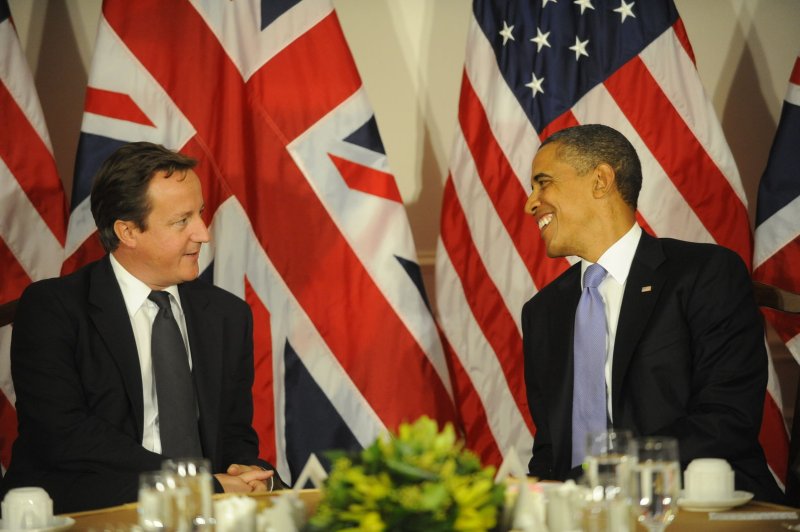British Prime Minister David Cameron (L) and U.S. President Barack Obama in New York, Sept. 21, 2011. UPI/Aaron Showalter/Pool |
License Photo
WASHINGTON, March 13 (UPI) -- Washington and London plan to stay the course on ending their nations' Afghan combat role by mid- to late 2013, despite obstacles and criticism, officials said.
U.S. President Barack Obama and British Prime Minister David Cameron were expected to reach a tentative agreement at the White House Wednesday on the Afghan withdrawal timetable, the officials told the British newspaper The Guardian, despite growing public outrage in Afghanistan over a U.S. Army sergeant's alleged massacre of 16 Afghan civilians, including nine children, Sunday and the deaths of six British soldiers killed by a bomb last week.
Following the massacre, the Taliban insurgency threatened vengeance and elders in the rural stretch of southern Afghanistan's Kandahar Province where the civilian attacks took place promised decisive retribution.
"Once they decide, there will be no army, no force, that can stop them," Abdul Rahim Ayoubi, a member of the Afghan National Assembly from Kandahar, told al-Jazeera.
The retaliation threats -- on top of violent anti-American protests in Afghanistan in February after U.S. personnel at Bagram Air Base inadvertently burned Korans, and an earlier video showing U.S. Marines urinating on dead Afghan militants -- threatened to derail efforts to draw the Taliban into talks and fuel political momentum to quicken the pace of the U.S. military drawdown from the country, The New York Times reported.
Obama and Cameron were expected to hold firm on their plans to move U.S. and British troops to a support and training role from a "lead combat" role by the second half of 2013, The Guardian reported.
This could involve a "support combat role," The Guardian said.
All NATO troops except those involved in training Afghan forces were expected to be withdrawn by the end of 2014.
The decision to shift to a support and training role would likely take into account "unequivocal advice" to the White House from U.S. Marine Corps Gen. John R. Allen, commander of the U.N.-approved, NATO-led International Security Assistance Force in Afghanistan, to keep NATO troop numbers as high as possible until September 2013, the end of that year's so-called fighting season, The Guardian said.
When U.S. Defense Secretary Leon Panetta said Feb. 1 U.S. forces would step back from a combat role "by mid- to the latter part of 2013," he said U.S. troops would "hopefully" just be involved in a "training, advice and assist role."
Obama pledged last June to bring home 10,000 troops by the end of 2011 and an additional 23,000 troops by this September. Britain is to send home 500 troops by September.
Other countries withdrawing troops this year include France, which said it would withdraw about 1,000 soldiers by the end of the year, leaving about 3,000; Belgium, which began withdrawing half its force of nearly 600 in January; Norway, which has begun withdrawing its nearly 500 troops; and Spain, which said it would begin withdrawing troops this year, with as many as 40 percent out of Afghanistan by mid-2013, and a complete withdrawal by 2014.
Canada withdrew its combat troops last July and has transitioned to a training role.















